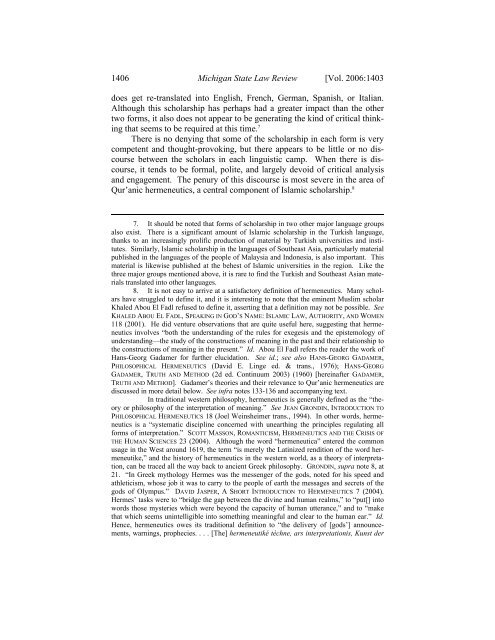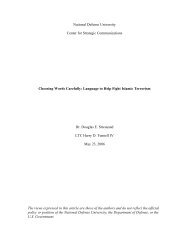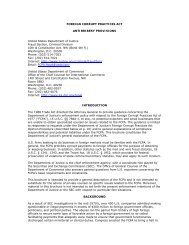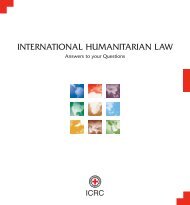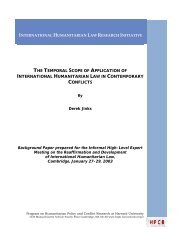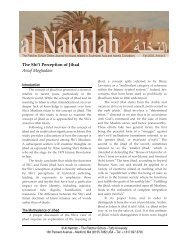some reflection on post-enlightenment qur'anic hermeneutics
some reflection on post-enlightenment qur'anic hermeneutics
some reflection on post-enlightenment qur'anic hermeneutics
You also want an ePaper? Increase the reach of your titles
YUMPU automatically turns print PDFs into web optimized ePapers that Google loves.
1406 Michigan State Law Review [Vol. 2006:1403does get re-translated into English, French, German, Spanish, or Italian.Although this scholarship has perhaps had a greater impact than the othertwo forms, it also does not appear to be generating the kind of critical thinkingthat seems to be required at this time. 7There is no denying that <str<strong>on</strong>g>some</str<strong>on</strong>g> of the scholarship in each form is verycompetent and thought-provoking, but there appears to be little or no discoursebetween the scholars in each linguistic camp. When there is discourse,it tends to be formal, polite, and largely devoid of critical analysisand engagement. The penury of this discourse is most severe in the area ofQur’anic <strong>hermeneutics</strong>, a central comp<strong>on</strong>ent of Islamic scholarship. 87. It should be noted that forms of scholarship in two other major language groupsalso exist. There is a significant amount of Islamic scholarship in the Turkish language,thanks to an increasingly prolific producti<strong>on</strong> of material by Turkish universities and institutes.Similarly, Islamic scholarship in the languages of Southeast Asia, particularly materialpublished in the languages of the people of Malaysia and Ind<strong>on</strong>esia, is also important. Thismaterial is likewise published at the behest of Islamic universities in the regi<strong>on</strong>. Like thethree major groups menti<strong>on</strong>ed above, it is rare to find the Turkish and Southeast Asian materialstranslated into other languages.8. It is not easy to arrive at a satisfactory definiti<strong>on</strong> of <strong>hermeneutics</strong>. Many scholarshave struggled to define it, and it is interesting to note that the eminent Muslim scholarKhaled Abou El Fadl refused to define it, asserting that a definiti<strong>on</strong> may not be possible. SeeKHALED ABOU EL FADL, SPEAKING IN GOD’S NAME: ISLAMIC LAW, AUTHORITY, AND WOMEN118 (2001). He did venture observati<strong>on</strong>s that are quite useful here, suggesting that <strong>hermeneutics</strong>involves “both the understanding of the rules for exegesis and the epistemology ofunderstanding—the study of the c<strong>on</strong>structi<strong>on</strong>s of meaning in the past and their relati<strong>on</strong>ship tothe c<strong>on</strong>structi<strong>on</strong>s of meaning in the present.” Id. Abou El Fadl refers the reader the work ofHans-Georg Gadamer for further elucidati<strong>on</strong>. See id.; see also HANS-GEORG GADAMER,PHILOSOPHICAL HERMENEUTICS (David E. Linge ed. & trans., 1976); HANS-GEORGGADAMER, TRUTH AND METHOD (2d ed. C<strong>on</strong>tinuum 2003) (1960) [hereinafter GADAMER,TRUTH AND METHOD]. Gadamer’s theories and their relevance to Qur’anic <strong>hermeneutics</strong> arediscussed in more detail below. See infra notes 133-136 and accompanying text.In traditi<strong>on</strong>al western philosophy, <strong>hermeneutics</strong> is generally defined as the “theoryor philosophy of the interpretati<strong>on</strong> of meaning.” See JEAN GRONDIN, INTRODUCTION TOPHILOSOPHICAL HERMENEUTICS 18 (Joel Weinsheimer trans., 1994). In other words, <strong>hermeneutics</strong>is a “systematic discipline c<strong>on</strong>cerned with unearthing the principles regulating allforms of interpretati<strong>on</strong>.” SCOTT MASSON, ROMANTICISM, HERMENEUTICS AND THE CRISIS OFTHE HUMAN SCIENCES 23 (2004). Although the word “hermeneutica” entered the comm<strong>on</strong>usage in the West around 1619, the term “is merely the Latinized renditi<strong>on</strong> of the word hermeneutike,”and the history of <strong>hermeneutics</strong> in the western world, as a theory of interpretati<strong>on</strong>,can be traced all the way back to ancient Greek philosophy. GRONDIN, supra note 8, at21. “In Greek mythology Hermes was the messenger of the gods, noted for his speed andathleticism, whose job it was to carry to the people of earth the messages and secrets of thegods of Olympus.” DAVID JASPER, A SHORT INTRODUCTION TO HERMENEUTICS 7 (2004).Hermes’ tasks were to “bridge the gap between the divine and human realms,” to “put[] intowords those mysteries which were bey<strong>on</strong>d the capacity of human utterance,” and to “makethat which seems unintelligible into <str<strong>on</strong>g>some</str<strong>on</strong>g>thing meaningful and clear to the human ear.” Id.Hence, <strong>hermeneutics</strong> owes its traditi<strong>on</strong>al definiti<strong>on</strong> to “the delivery of [gods’] announcements,warnings, prophecies. . . . [The] hermeneutiké téchne, ars interpretati<strong>on</strong>is, Kunst der


